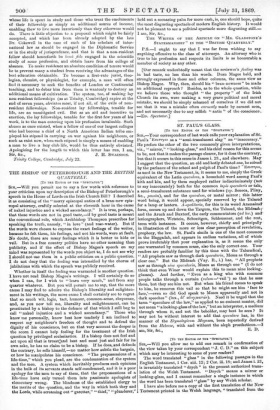ST. PAUL'S GLASS.
(To THE EDITOR OF THE "SPECTATOR.") Sut,—Your correspondent of last week calls your explanation of St. Paul's EfivirrpcP as a " semi-translucent slag " an "inaccuracy." He prefers the other of the two commonly given interpretations, viz., " mirror," "looking-glass," and his chief reason for this seems to be, not that it makes the passage clearer, for it does the contrary, but that it occurs in this sense in James i. 23., and elsewhere. May I suggest that the question, an old and hotly debated one, be solved by the parlance of the school and pulpit of Paul's time? " EcroIrrpoi,, as used in the New Testament, is, it seems to me, simply the Greek equivalent of the Latin speculare, a household word among Paul's kith and kin, and by them employed rather indiscriminately (not to say inaccurately) both for the common lapis specularis or talc, a semi-translucent substance used for windows (ap. Seneca, Pliny, &c., passim), and for the speculum, or metal mirror ; this latter word being, it would appear, specially reserved by the Talmud for a lamp or lantern. A-spaklaria, for this is its weird Aramaized' form, occurs up and down the Targum, the Talmud, the Midrash; and the Aruch and Buxtorf, the early commentators (ad loc.) and lexicographers, Wetatein, Schoettgen, Schleuasner, and the rest, teem with instances. It occurs, however, chiefly and principally in illustration of the more or less clear perception of revelation,. prophecy, the law. St. Paul's simile is one of the most common- in the Haggadah, and appears in endless variations, all of which prove irrefutably that your explanation is, as it seems the only- one warranted by common sense, also the only correct one. Your- readers are probably familiar by this time with the Talmudical, "All prophets saw as through dark specularia, Moses as through a clear one." But the Midrash (Vay. R., i.) has, " All prophets saw as through nine specularia, Moses as through one" (I do not think that even Winer would explain this to mean nine looking- glasses). And further, " Even as a king who with common; people talks through a curtain (velum—' vail ') so that he sees them, but they see him not. But when his friend comes to speak to him, he removes this vail so that he might see him ' face to face,'—even so did God speak to Moses apparently and not in dark speeches" (lxx., cchvicsaran). Need it be urged that the term " speculare of the law," as applied to an eminent master, did not mean " a looking-glass of the law," but an interpreter, a medium. through whom it, and not the beholder, may best be seen ? It may not be without interest to add that speculare has, in the manner of the Etymologicum Magnum, been repeatedly derived from the Hebrew, with and without the aleph prostheticon.—E






























 Previous page
Previous page